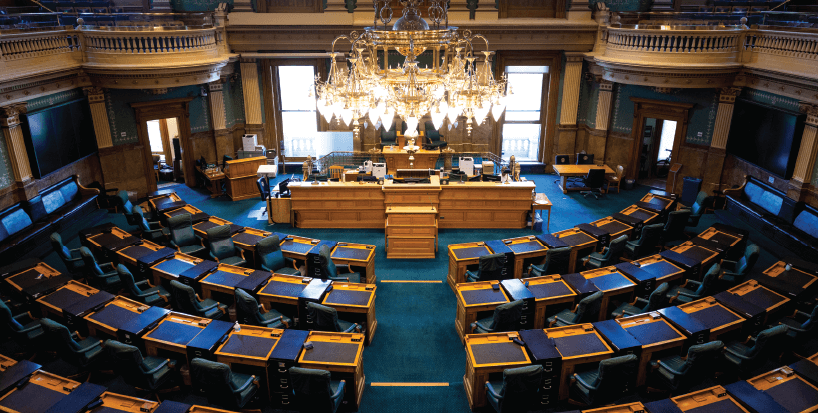2025 Colorado Legislative Session Wrap-Up: What It Means for Housing Providers

The First Regular Session of Colorado's 75th General Assembly concluded on May 7, 2025, marking the end of a busy 120-day legislative cycle. Legislators introduced 657 bills this year, slightly fewer than the 706 in 2024, but the impact was no less significant. For the Colorado Apartment Association (CAA) and its members, the session was marked by a continued focus on housing, tenant rights, regulation of rental practices, and attempts at systemic reform. Below is a detailed breakdown of the key developments, victories, and ongoing concerns.
POLITICAL & FISCAL LANDSCAPE
The 2025 session began with a notable shift in the House—Democrats lost their supermajority, and several far-left members were replaced by more moderate Democrats. The Senate's composition remained the same, although three senators resigned and were replaced via vacancy appointments.
Colorado's challenging fiscal reality was a key factor throughout the session. With a $1.2 billion shortfall stemming from the expiration of federal COVID-era funds and costly legislation passed in prior years,the Joint Budget Committee had to make hard cuts. Significant reductions included:
- $71 million cut from transportation projects,
- $42.2 million cut from the Healthy School Meals for All Program,
- While maintaining a 15% General Fund reserve.
These constraints meant that bills not only needed to survive policy scrutiny but also pass a financial viability test—a factor that helped temper the legislature’s usual progressive ambitions.
CAA Legislative Highlights: Major Legislative Priorities and Actions
The 2025 session saw another surge in tenant rights legislation, with CAA fighting to moderate or oppose many of the proposed measures.
- HB25-1004: Algorithmic Rent Pricing
Position: Amend, Veto Granted
This bill prohibits the use of algorithmic devices for rent pricing coordination, treating
them as illegal restraints of trade. CAA strongly opposed the final version, deeming it
unworkable, and requested a gubernatorial veto. - HB25-1235: Jury Trials in Evictions
Position: Oppose
After passing the House by a single vote, this bill failed in the Senate Judiciary Committee.
It would have granted jury trials in eviction proceedings—creating delays and financial
burdens for housing providers. - HB 25-1093: Limiting Anti-Growth Laws
Position: Support
This bill restricts local governments from passing laws that reduce residential density in
urban areas, unless offset by increased housing elsewhere. - HB25-1273: Smart Stairs in Multifamily Buildings
Position: Support
Allows construction of up to five-story multifamily buildings with a single stairwell,
reducing development costs while maintaining safety standards. - HB25-1092: Fair Market Rent Increases
Position: Support
This bill would have clarified that rent increases aligned with market rates are not
discriminatory or retaliatory.
CAA's Advocacy in Action
In a climate increasingly favorable to tenant protections, CAA successfully negotiated key amendments to ensure legislation remained workable for housing providers.
- HB 25-1168: Expanded Protections for Victims of Gender-Based Violence
Early drafts would have allowed leases to be broken without any financial impact and required burdensome disclosures from landlords. CAA’s amendments preserved survivor protections while allowing landlords to recover up to one month’s rent and provided clarity around confidentiality and eviction procedures. - HB 25-1207: Pet Ownership in Affordable Housing
The original proposal broadly required acceptance of nearly all pets. CAA limited the scope to two pets (dogs or cats), preserved leash and cleanup policies, and protected landlords from liability associated with unrestricted pet access. - HB 25-1249: Security Deposit Reform
Proposed sweeping changes to deposit handling. CAA inserted provisions defining “excessive uncleanliness,” created an optional virtual move-out inspection process, and clarified documentation requirements. The bill also allows electronic refunds and protects landlords from unreasonable carpet damage claims.
Monitoring and Opposing Costly Mandates
While collaboration is a cornerstone of CAA’s advocacy strategy, the Association was also firm in its opposition to proposals that would significantly increase costs, diminish property rights, or create unmanageable compliance burdens.
- HB 25-1269: Building Decarbonization Mandate
Established a new regulatory office and imposed a $400 annual fee on covered properties CAA opposed this bill due to future performance mandates and the disproportionate impact on small and mid-size housing providers. - SB 25-020: Government-Driven Receiverships
Enables the state and local governments to place multifamily properties under court-appointed receivership. Despite successfully inserting safeguards like judicial review
and reporting, CAA continued to oppose the bill due to potential overreach and redundancy with existing enforcement mechanisms.
Defeated or Postponed Bills of Interest
While not all defeated bills were explicitly opposed by CAA, several high-profile proposals that would have significantly impacted housing policy failed to advance. Other bills were monitored closely, while others were supported for the conversation they generated.
- HB 25-1169 (Monitored)
Would have required local governments to allow residential development on land owned by churches and schools, regardless of zoning. While the bill aimed to increase affordable housing, it raised concerns around infrastructure, neighborhood compatibility, and local control. Ultimately, it failed to pass the Senate. - SB 25-131 (Supported)
A sweeping housing deregulation proposal that included changes to construction defects law, lease terms, and energy codes. Though supported for its pro-housing intent, the bill was viewed as a “statement bill” and did not receive a committee hearing until late in session—effectively stalling its progress. - HB 25-1286 (Opposed)
Would have created complex requirements for employers during extreme heat or cold, impacting property maintenance operations. CAA opposed the proposal, which was ultimately postponed indefinitely. - SB 25-318 (Monitored)
Attempted to revise Colorado’s newly passed AI regulations before implementation. Introduced too late in the session to pass, it may return in a future special session. - HB 25-1202 (Monitored)
Would have created mandatory mold disclosures in leases and sales. CAA supported streamlining disclosure language but the bill was not prioritized due to funding and died on the calendar.
Emerging Issues and Broader Trends in Housing Legislation
In addition to high-profile bills around eviction, rent pricing, and security deposits, several emerging areas of legislation reflected Colorado’s evolving approach to housing regulation—
from consumer protections to environmental sustainability and transit policy. These bills illustrate how interconnected housing has become with broader policy domains, and how CAA is remaining engaged across all fronts.
- HB 25-1090: Deceptive Pricing Practices in Housing Fees
Position: Monitor | Status: Signed into Law
This consumer protection bill prohibits certain fees in rental agreements unless they are explicitly disclosed and permitted under law. Landlords may no longer charge for maintenance of common areas, property taxes, or administrative fees unless specific conditions are met, and must offer a cost-free payment method for rent. CAA monitored this bill closely to ensure that it did not unintentionally restrict legitimate fee structures or lease terms. - HB 25-1108: Lease Terms After Tenant Death
Position: Support | Status: Awaiting Governor’s Action
This bill prohibits enforcement of certain lease penalties—such as liquidated damages or accelerated rent—following the death of a tenant. It also allows landlords to regain possession of a unit without an eviction proceeding in certain circumstances. CAA supported this compassionate but clear-sighted approach, which also preserves landlord rights to retain deposits for any resulting property damage. - HB 25-1113:Turf and Water-Wise Landscaping for Multifamily
Position: Amend/Monitor | Status: Sent to Governor
In response to climate challenges, this bill restricts the installation of nonfunctional turf in new or redeveloped multifamily projects. CAA successfully amended the bill to clarify that it does not apply retroactively to all renovations—only when landscaping is being updated. This ensures compliance without creating unreasonable burdens for property owners. - HB 25-1236 – Tenant Screening Process Adjustments
Position: Amend/Monitor | Status: Sent to Governor
The original bill proposed removing credit checks for tenants with housing subsidies and banning landlords from requiring access to third-party screening reports. CAA worked to
narrow the scope of the bill significantly—ensuring that tenant screening remains a fair and functional process for providers. Most controversial provisions were removed in the Senate. - SB 25-161: RTD Transit Reform & Housing Linkage
Position: Amend | Status: Signed into Law
This transportation-focused bill has housing implications. It requires owners of certain new developments to survey tenants about interest in RTD eco-passes. If a majority express interest, landlords must provide passes—costs may be passed on to tenants, and administrative fees are covered by RTD. CAA ensured that the implementation timeline and survey process are manageable for housing providers. These bills reflect an important trend: housing legislation is no longer limited to traditional landlord-tenant issues. Increasingly, legislators are exploring the connections between rental housing and issues like climate adaptation, equitable pricing, public transit, and consumer protection. CAA will remain proactive in addressing these cross-sectoral trends in the 2026 session and beyond.
